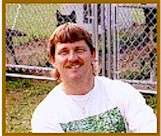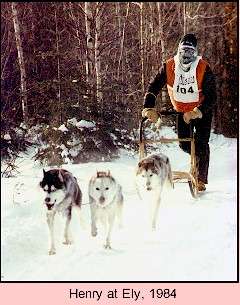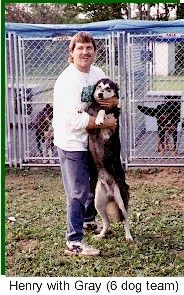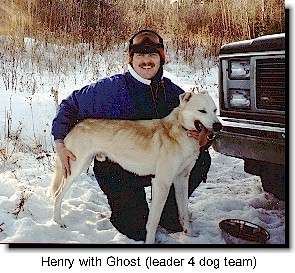Meet Ontario Sprint
Musher Henry Csabak

Name: Henry Csabak
Kennel Name: Howling Wolf Kennels
Birthplace: Thunder Bay, Ontario, Canada
Home Town: Kakabeka Falls, Ontario Canada
Occupation: Elementary School Teacher |
 |
My wife Debi and I live on 62 acres in Kakabeka Falls,
Ontario, which is about twenty minutes outside of Thunder Bay. I raced a three dog team
from 1980 to 1984. At the moment Debi and I manage a kennel of sixteen dogs, all Alaskans
except for Bandit, a purebred Siberian Husky. When not running dogs, I enjoy playing
tennis and running myself. I have completed one marathon, a half marathon and have run
many local races in Thunder Bay distances varying from 5km to 10 mile road races.
What is your primary sled dog activity or area of
interest?
My primary sled dog activity is sprint racing in the four and six dog classes.
 How long have you been involved with sled
dogs? How long have you been involved with sled
dogs?
As mentioned earlier I began running and racing a three dog team in 1980. I left
the sport in 1984 due to personal reasons. I however, kept all my equipment, sleds, lines,
harnesses with the intent of someday returning to the sport. This day arrived about four
years ago when I was asked to do some recreational racing with a team of Siberian huskies.
Once again experiencing the thrill of being on a sled and training and conditioning dogs,
the desire to go faster resulted in our buying a couple of Alaskan Huskies.
What sparked your initial interest in sled dogs?
Meeting people in early 1980 that belonged to the Nanabijou Sled Dog Club in
Thunder Bay sparked my initial interest in the sport.
If you remember your very first time behind a team of dogs, tell
us about it.
My first experience on the sled was behind a two dog team. My Siberian leader
Kaelik and a Samoyed in wheel. Although I wasn't going very fast, at the time I thought I
was flying. In my first year of racing, I spent more time running than my dogs did, but I
still believe that a musher has to be in shape to help his team.
What size kennel do you operate?
At the moment Debi and I manage a kennel of 16 dogs (15 Alaskans and 1 Sibe).
Give us an overview of your feeding program.
We feed National Competition Xtra and Eagle Power Pack. We also use Annamaet
Impact during training and racing season.
What advice would you give a beginning musher?
First of all you must ask yourself whether or not you want to be a competitive or
recreational musher. Sometimes this can be decided by the number and type of dogs that you
already have in your yard. Talking to a musher with experience can help to give you an
assessment of your team. They will provide you with an honest appraisal of your team and
can also give you advice on how to improve your existing team. Should you be in a building
process and want a competitive team, go to the mushers with the greatest success. When
purchasing a dog, know what you are getting. Ask important questions that center around
performance. You probably won't get their best dogs, but you can purchase proven
performers. Most importantly, competitive or recreational, give your dogs the best care
possible. Make sure that they are well fed, watered and keep their living quarters clean
and comfortable. Spend time with each one of the team and work to create a bond of trust
between you and your dogs.
Summarize your basic kennel management style.
Debi and I would prefer to keep a small kennel. We both hold down full time jobs
and having more dogs than we could handle would take the fun out of the sport. We have not
progressed to breeding dogs other than splitting a litter born in July from one of our
males and have preferred to buy proven performers.
Our main priority is to provide the best care for the dogs that we can.
It is a team effort!!
What breed(s) do you work with?
We work with Alaskan Huskies but have one Siberian. He has trained with our dogs,
but does struggle with the pace from time to time.
What physical characteristics do you look for in your dogs?
I used to like the dogs with longer legs and a lot of space under the torso. This
has changed somewhat over the last couple of years and now I look for a dog that is well
proportioned. I also like bigger dogs, but I have some 35-40 pound dogs that are quite
fast.
What mental or emotional attributes do you require in your dogs?
I like a hard working dog. I judge this by carefully watching the tuglines to
make sure that they are tight. I also
look for a dog that shows a lot of confidence and demonstrates an eagerness to run.
Tell us about an all time favorite dog or two:
My all time favourite dog believe it or not was a Siberian Husky named Kaelik. He
was about 60 pounds, long legged and very hard working. Although not the fastest dog, he
had great pulling power and was an excellent trail leader. He lived to about 15 years old
and I kept him after my temporary retirement from the sport in 1984. Debi and I still talk
about him and we miss him dearly. Another favourite of mine was an Alaskan Husky named
Packer that I ran in wheel in the early 1980's.
What is the training/racing philosophy of your
kennel?
I try to keep the dogs excited about running. Keeping a consistent schedule of
training and conditioning is very
important. I believe in keeping the distance short to begin with and then build on the
mileage. I want the dogs to run fast but not all the time. The best advice that I can give
is to buy the Speed Mushing Manual by Jim Welsh, an excellent book on building strength,
speed and endurance.
 Do you have specific training goals for your team(s)? Do you have specific training goals for your team(s)?
I try to have the dogs ready for the first race of the season in early January. I
also hope to keep all the dogs eager and excited to race the duration of the season.
Avoiding injury and burnout are also a major goal.
How do you choose which races to enter?
We joined the North Star Sled Dog Club and will try to run as many of their races
as we can. Debi even plans to race a four dog team at some of the races this year.
What does it take to win?
Simply put, you need the best dogs to win. I also believe that experience plays
an important part. An experienced musher who has good dogs will usually be well prepared
and not make the rookie mistakes that an inexperienced musher can be prone to make. I will
often call upon those with experience to ask for their advice to assist me in training and
conditioning my dogs.
What is the future of sled dog sports?
I would like to see more people get involved with the sport. I think we need to
encourage the recreational aspect of running sled dogs, as well as the competitive
aspects.
What can individual mushers do to support and promote the sport?
As a teacher, I try to make children and their parents aware of the sport.
What part do clubs and organizations play in sport development?
At the moment we don't have an organized club in our area. Hopefully this will
change in the future. An organized group can hope to bring more people into the sport as
well as create a better awareness of what sled dog racing is all about.

[back to Interview list]

top of page |
home |
feedback | search

|



